#I get too wordy in these things
Explore tagged Tumblr posts
Text
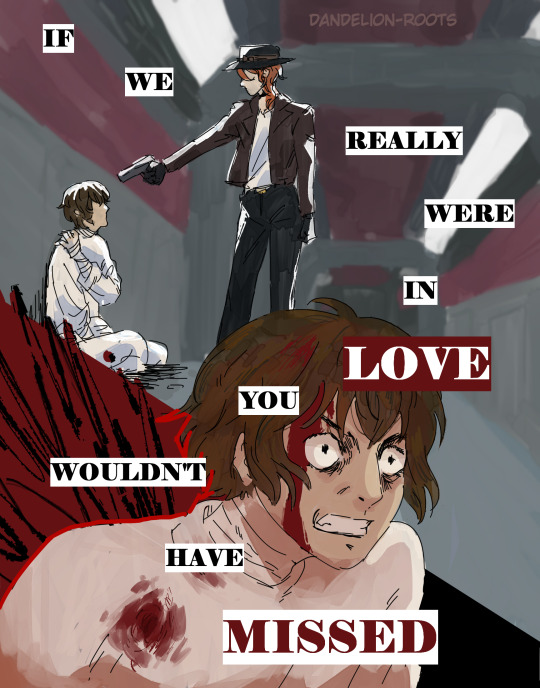
[ID: a digital redraw of the scene where chuuya shoots dazai in the shoulder. on the top of the drawing is chuuya holding a guy to dazai's head in the red and grey hallways of the prison. on the bottom of the drawing is dazai's pained face. the gunshot is shown stylistically as hectic lines behind his bloody shoulder. over the image is half a quote from goncharov that reads 'if we really were in love you wouldn't have missed.' the signature says dandelion-roots. end ID]
This quote from Goncharov (1973) in relation to soukoku has been haunting me from before I even got to that scene in the anime (the full thing is: Katya- Of course we're in love, that's why I tried to shoot you/ Goncharov- If we really were in love you wouldn't have missed). Violence as a tool for communicating emotions, especially love and hatred, especially love and hatred makes me go feral- how could I not think of the iconic quote that says that katya's miss was a sign of a lack of love/a fake love when chuuya didn't miss? Just... losing it over here.
#bsd#bsd s5#bungou stray dogs#soukoku#soukoku fanart#bungou stray dogs season 5#bsd spoilers#dazai osamu#chuuya nakahara#not to tell on myself but i just realized that i. used the wrong screenshot as ref JKDSKDJKDJ i have too many saved. its fine. u get it#just saying it in case anyone was confused#goncharov#also just to be clear if someone didnt understand the caption- i used the quote to be the opposite of what was happening#not to describe what was happening in the scene or to imply that chuuya later not killing dazai was him 'missing'#i get VERY specific imagery in my mind and i disregard everything else#and i do it in the way that would be incredibly confusing to most ppl at first glance. such is the world#im not wordy rn i cant fully describe my feral state after finishing bsd earlier today or this thing. hope u enjoy it anyway!#it was rly fun to do a screenshot redraw the bsd animation crew is so freaking talented and i got to see which colours they used where#i changed them bcs they wouldnt been too desaturated but lots of blues in the bg! colour theory babyyy#and got to play around w csp! fun fun been so long since ive done digital art
972 notes
·
View notes
Text
tales of the passerine - danny fenton being bruce wayne's first kid
okay okay. so this is like a continuation/elaboration of my oneshot/prompt i wrote about the idea that Danny was the first batkid. We have a lot of aus where he joins the family after the rest of the bats do, right? So hey! Lets shake things up a bit. Danny is the first to be adopted by Bruce Wayne.
Danny's parents and unfortunately Jazz die shortly after the events of TUE -- how so? I was gonna say an ecto-filter explosion, that would call back to the TUE explosion and trauma behind that. But lets do something new! Carbon-monoxide poisoning.
It's not too unexpected for something to break in the Fenton house, especially with the Fenton parents' questionable understanding of proper weapon handling and lab safety. The water heater broke from a stray shot by one of the weapons, and was promptly MacGyver'd incorrectly. Danny went to stay with Tucker for a guys' night, and came back to a dead silent house.
(Danny's neighbors got a very unfortunate shock when he ran to the next house over in hysterics.)
There was a lot of shuffling around with CPS, the police. People had to be called in to handle the equipment in the lab, and the GIW was rumoring to show up in aid to clearing the scene. When Danny heard of that, he immediately went and dismantled the ghost portal to the best of his abilities. He burned the physical blueprints of all his parents' inventions, their blueprints on the ghost portal, and their most dangerous weapons were destroyed beyond recognition. Anything to prevent the GIW from getting their hands on his parents' tech.
It opened up another investigation, but he was not under the list of suspects. He was placed in the care of Vlad Masters, where they then went back to the rebuilt castle mansion in Wisconsin. Danny, terrified of the future that has once passed and may do so again, shuts down in his grief. Inadvertently, he ends up somewhat repressing his ghost half. Something Vlad, who is grieving Madeline but relishing in Jack's demise and his custody of Daniel, is not very happy with.
Vlad's... gone into a bit of a mental health spiral. He's becoming increasingly possessive over Daniel, the final remnants of his friends and a liminal being like him. He doesn't like that Danny's repressing his ghost half -- both out of genuine concern as a ghost, but also because of his desire to control Danny and groom him into the perfect son. If you ever had a phase where you read Dark SBI found family fics, first off; me too bro, and second off; those are the vibes I'm thinking of.
Danny's mentally shut down from grief! And fear. He's dropped into a bad depressive state -- paralyzed with grief and the terror of the inevitable. Clockwork saved his parents because he believes in second chances, but what's the point of that when his family ended up dead anyways? Danny doesn't wanna believe that he's destined to become evil, and he's holding out onto that hope, but it's a thin line, and he feels utterly hopeless and trapped. He hasn't used his powers or ghost form since he trashed the lab, and Vlad has alarms set up to prevent him from trying to escape.
He's also unintentionally cut off Sam and Tucker -- both of whom are so scared and concerned for Danny too, and are trying their damndest to reach out to him. He keeps ignoring their texts. Danny basically haunts Vlad's manor. He goes out to eat if he has to, attends parties Vlad drags him to, and stays in his room all day if he can.
At parties, Vlad doesn't allow Danny to leave his side, or really talk to anyone -- not that Danny wants to. A product of Vlad's increasing possessiveness. Well, he almost doesn't let Danny leave his side. Danny has a habit of slipping off to hide somewhere for the parties whenever he can, and Vlad reluctantly allows it so long as he stays alone.
This becomes an advantage when eventually, Bruce Wayne returns to Gotham after missing for years, and holds a bright charity ball to celebrate the return. Vlad has been chomping at the bits to get his hands on Wayne Industries, and with the return of its owner there is no better opportunity to wipe out his rival. He goes, and he as normal, brings Daniel with him.
Vlad thinks Wayne will bleed his little heart out for Daniel's poor orphan sob story -- he's a fellow orphan himself, after all. He's not wrong; Wayne's little heart will bleed, just not in the way that benefits him.
Bruce sees Vlad and Danny approaching before they're even close enough to introduce themselves - and like with many of the children he will soon come to care for, it's like someone set a mirror into the past right in front of him.
Danny Fenton's suit is tailor-made for him, and despite the fact that it's his perfect size, the sag in his shoulders, the ducked down head, and the way he hunches into himself all pictures the image of a child in shoes too big for him. There's a far away, glazed over look in his eyes and grief marble-cut into the lines of his face. There's not enough makeup in the world that will hide the dark circles under his eyes.
("My nephew, Daniel Fenton." Vlad's hands are possessive on Danny's shoulders. Bruce immediately notices the way the boy tenses under his touch. "His parents passed recently, and as his godfather I was designated his guardian.") ("I'm so sorry, the loss must've been terrible.") ("Yes, carbon-monoxide poisoning caused it. Daniel was out with friends, when he came home... they had already passed.") (Bruce immediately dislikes that Vlad shared the details of their death unprompted -- he likes it even less when Danny flinches at the reminder and hunches into himself.)
Danny runs off at some point earlier into the charity. At this point, parties are still being held at Wayne Manor (because iirc google search mentioned that was a thing at first before it was changed), so he disappears and hides in one of the empty rooms nearby. It just so happens to be the same room Bruce Wayne hides in when he needs a break from all of the socialization.
Thus begins a long, long process of trust. Bruce can't reveal his hand as being smarter than he looks, but he can be compassionate. Kindness needs no measure of intelligence. He keeps Danny company for as long as he can before he runs the risk of being found.
Rinse and repeat. Vlad insistently wants Wayne Industries, and he'll go to as many Wayne parties as he can to get his hooks into the man. The problem is that Bruce Wayne is never alone, and getting him alone is impossible. Finding him too. It's like the man never stops moving. Always talking to someone, always circling somewhere. He orbits around the room as if he isn't the sun of the Gotham Elite's solar system.
Danny's had such repetitive behavior that Vlad never thinks to believe that Bruce Wayne is disappearing to go talk to him. That "Vlad's" son is even interacting with him at all. Danny never gives him a reason to think so, and neither does Bruce.
Danny doesn't actually acknowledge Bruce until a handful of parties in, where he hands Bruce a small slip of paper he smuggled in that says; "don't trust Vlad". Danny's face stays carefully blank, but he's so tense that his hands are trembling, and he's purposely looking away from him. Bruce plasters a smile onto his face, slips the paper into his pocket, and tells him "okay".
(he's been busy with his own goals with the mafia, but he sets aside time to investigate Vlad Masters. He was holding off. Until now.)
Danny does eventually start speaking to Bruce, he's starting to really like the guy. He's starting to see a little hope, even as Vlad is starting to get more and more agitated with him the more he refuses to use his powers.
He reaches out to Sam and Tucker again, and starts trying to reconnect with them. Vlad has spyware on his phone, and he limits the amount of times he can talk to them. A weird parental control lock of some sort that leaves a time limit on how long he can talk to them for. 30 minutes. Danny doesn't tell them anything about Mr. Wayne.
Danny, slowly, wants out of here, and he's slowly gathering the motivation to do it. Vlad is genuinely scaring him -- and Danny wonders just how truthful the past-future Vlad was when he told him that Danny wanted his ghost half separate. He starts trying to come up with an escape plan.
Vlad has anti-ghost wards everywhere around the mansion, and while they're always on, they boost to full power at sunset. The doors and windows are always locked, all main exits have alarms set on them. The only reason it's not super extensive is because Danny hasn't tried leaving at all yet, so Vlad hasn't had to tighten anything.
At night, Vlad locks the door to his room and puts up an anti-ghost ward around the room. The mansion is on the outside westward side of Madison, more entrenched in rural Wisconsin. The closest town is a four-way stop sign with one house on three corners, and an open bar on the fourth. Not much to go.
He refuses to go to Sam and Tucker; Vlad would look there first. It's too dangerous. Vlad would sound alarm bells and have a manhunt looking for him, Danny can't risk going just anywhere. Too much risk of being found, sold out, or caught. There's really nowhere for him to hide.
Until there is. Bruce is telling Danny about the history of Wayne Manor, and says, as casually as saying the weather; "The manor has dozens of empty rooms, I'm sure Alfred wouldn't mind filling another one if he could." And quietly, hesitantly, Bruce places a careful hand on Danny's shoulder, unrestrictive and gentle; "He wouldn't mind getting one ready for you if you need one."
And there it is. There's his out.
Danny, just as quietly, replies; "I'll keep that in mind."
The ball starts rolling.
Now I've been trying to summarize this au as much as possible for length convenience, but Vlad has been steadily growing more and more controlling. More emotionally manipulative. More agitated at Danny for not using his powers.
He wants Wayne Industries under his thumb but he's been steadily growing more and more concerned with Danny. He's started grabbing him, yanking him around, shaking him; trying to goad him into using his powers. He gets angry when Danny doesn't react, or tells him he doesn't want to use his powers. He hasn't outright attacked him, but he's getting there. This has been happening over the time it takes for Bruce to indirectly offer Danny sanctuary at his home.
It all comes to a head when Vlad stops going to parties at all -- something Danny has to pretend he isn't upset about -- because Vlad doesn't want him around other people anymore. Vlad rarely goes now without him, and only leaves to go to a Wayne function or to handle something at VladCo.
Danny can't wait for Vlad to leave long enough to escape. So he leaves during the night of a big storm. Vlad's locked him in his room, but Danny doesn't bother trying to go for it; he goes to the alarmed window instead. Danny's been repressing his ghost half so long that he can't access his powers immediately anymore -- he can feel it, he knows its there, but he can't quite reach it.
He breaks the lock by hand.
Immediately the alarm goes off through the entire castle, filling the room with red, and he scrambles for the rope the Wisconsin Ghost left for him a few months back. Danny's already out and climbing down the side of the castle before Vlad even reaches his door -- the only good thing about the entire room being ghost-proof is that Vlad can't get in that way.
The rope ends before it reaches the bottom, and he's still twenty feet in the air. It won't kill him if he lands it right. Danny takes his chances, and drops. He breaks his ankle, but he survives.
And he fucking books it to the back garden. He hears Vlad shrieking over the thunder and rain.
I'll save the full experience for a future oneshot, but Danny makes it out into the nearby woods and forcibly experiences what it's like to be in a horror game, trying to hide from the thing that's hunting you. There's only one thing going through his mind; "i'm going to die"
I have this mental image for this scene. Very stereotypical horror imo. Where Danny is hiding behind a tree, with a hand over his mouth, and Vlad is a few feet away from him, glowing ominously red through the trees, trying to search for him.
Danny doesn't get away from this unscathed, but he does get away alive. That's all he could ask for. He gets away by getting his ghost half awakened long enough to transform into Phantom and fly to Gotham.
But he gets to Wayne Manor, he gets to Bruce. Or, at least, Alfred answers the door from his insistent pounding. Danny's just in tears and Alfred gets him in the living room, wrapped in a towel, with ice on his swollen leg before he has to step out and alert Bruce.
Bruce already breaks multiple traffic laws on a nightly basis. And that's just with the sheer existence of the batmobile itself, not including the speeding and military artillery attached. He breaks double the amount trying to speed back to the cave and get out of the suit.
Right off the bat: Bruce will know, at least before Dick enters the picture, about danny's powers. He'll figure out something considering the fact that Danny traveled from Wisconsin to New York in a single night. That'll be a bit of complicated affair, but I've already got something in mind.
Actually it'll probably be very soon after Danny joins the family, because Bruce tries to offer to fight for custody for Danny - the state Danny was in at arrival is clear enough evidence for a trial. But Danny immediately shuts it down, says it's not going to work and then Vlad will know Danny's with him and he won't be safe. He tells him that Vlad cannot know Danny was with Bruce.
Danny's biggest regret was not telling his parents he was a halfa, and while he doesn't want to tell mister wayne (yet), he does tell him about Vlad being one. He needs to know why Danny can't be seen with Bruce. So he tells him, and Danny's current plan is to just hide out from Vlad until he turns 18. That way, he has no more legal jurisdiction over him. After that? He's not sure.
And to wrap this up, since this has already gotten very long and I can make more posts about this au later; I've thought about it, and I'm going to say that Danny does become a vigilante before Dick enters the scene. He goes by, as you probably guessed; Nightingale. "Gale" for short.
#dpxdc#dp x dc#danny fenton is not the ghost king#dp x dc crossover#dpxdc crossover#tales of the passerine au#i dont want to overemphasize how much vlad sucks but also i dont want to downplay it. but also i didn't wanna make this post too long#i didn't emphasize enough on vlad's possessiveness but i wanted to make this post as general enough as possible for the au.#for some more wiggle room in the future if i make more posts about this au.#the consequences for Danny repressing himself was not a concern i was focused on for the post but i am thinking about it and mulling it ove#i'll be blunt my main specific reason for why this occurs shortly after tue is bc it means dani doesn't exist yet and it means i dont have#to include her in the continuation of this au. i love that girl but she's a dead weight. i dont wanna come up with an elaborate reason as#to why she's not in the picture when i can just say 'she never created in the first place' instead. i don't have anything for her to do#I don't want to risk giving her a poor plot line just so that she exists in au.#sometimes i really hate just how long my posts get. i feel like it kills my engagement. but i also don't want to make posts that have#a part 1 and part 2 just because I think it got too long.#i feel kinda bad for having Danny take the spot of 'first partner' from Dick. But that was part of the reason i was inspired to make this a#i've already got the skeleton of a reasoning for danny becoming a vigilante being made in my head.#He can't go by Phantom since that risks drawing Vlad's attention -- a new vigilante showing up in Gotham. a place the visited frequently#who goes by the name Phantom? He'd be on that faster than chickens on meat. and nightingale has familial meaning behind it due to being#part of an ancestral name. it follows robin's theme of using it to honor his parents while still having its own unique enough lore to stand#on its own without feeling like a cheap copy. plus the bonus meta reason that it follows the bird theme. which personally is vital to me#my other alternative to Nightingale is Sparrow. mostly because it has good phonetic structure for a hero name. not too many syllables#a good balance of consonants and vowels. dont want a hero name with too many syllables or unbalanced consonants. or worse; both.#my reasonings is that hero names should be easy for a civ or teammate to yell while still being understood. max amount of syllables before#it threatens to become too wordy is 3. If it goes over 3 it should have a balanced consonant-vowel ratio. Wonder Woman is a good example#some things got cut here that were in the initial oneshot. like danny giving bruce his physical ghost core and showing up bloody.#the first son au
375 notes
·
View notes
Text
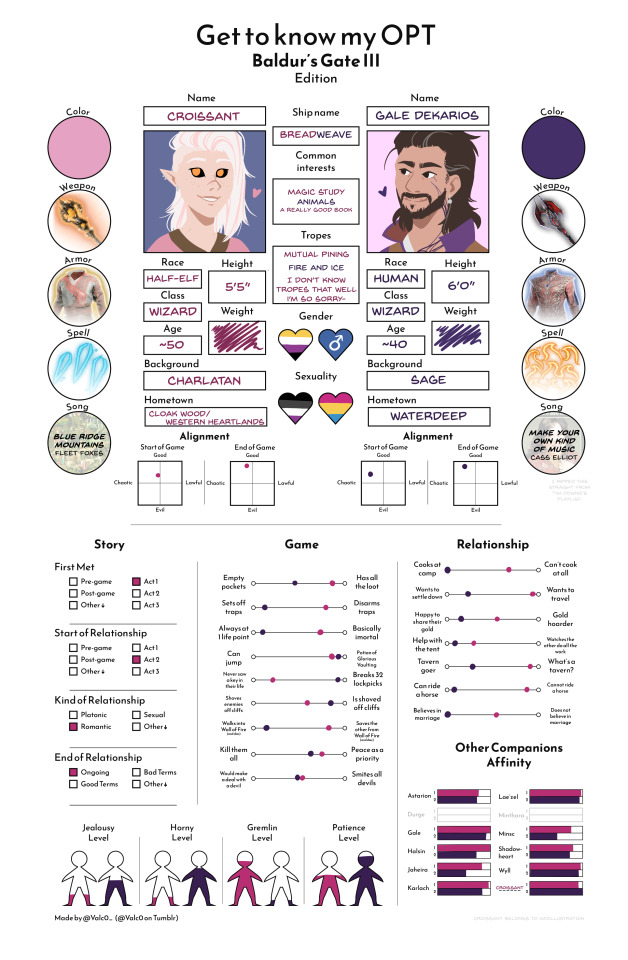
The desire to draw these two again but without the motivation to make something more than one of these little charts (oops)
Thank you Valc0 for making the sheet!
#I still need to play the epilogue#and draw things from the epilogue#and anSWER SOME OF THE QUESTIONS IN MY INBOX BAREEE IF YOU'RE READING THIS I'LL GET TO IT I PROMISE#IF YOU REMEMBER WHAT YOU ASKED THE SHORT ANSWER IS YES THE LONG ANSWER IS IT'S COMPLICATED haha#& then also make fanart of other tavs I've got a backlog of inspiration but commissions and the elden ring DLC are just RIGHT in front of m#What else can I ramble about in here#The way I had to look up all the stupid woods around Baldur's Gate#once again my paranoia that I'll Get Lore Wrong bc I'm invested but not THAT invested lol#They lived in Baldur's Gate for a few years then moved back out to the Cloak Wood that's my headcanon for that#I think these two also have a lot of common interests but they were all too abstract or wordy to put here#like falling asleep on the balcony#or listening to the sounds of the sea#I saw a lot of other people list Gale as lawful pre-game and I'm.....skeptical haha#ok sorry I'm done have a lovely day!#bg3#baldur's gate 3#bg3 tav#bg3 otp#valc0#bg3 croissant#gale#gale dekarios#breadweave
141 notes
·
View notes
Text
You'll never guess who the kinda primary subject of this yappost/doodle dump is
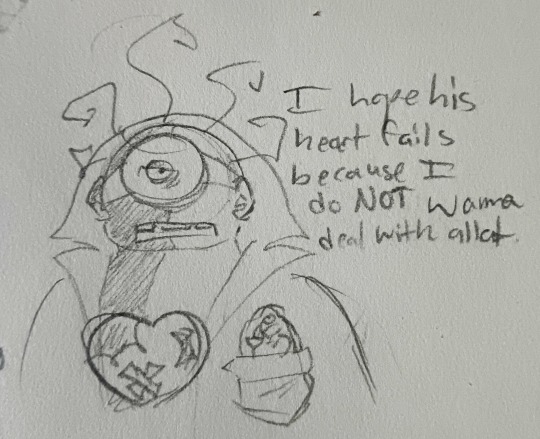
sigh. it always comes back
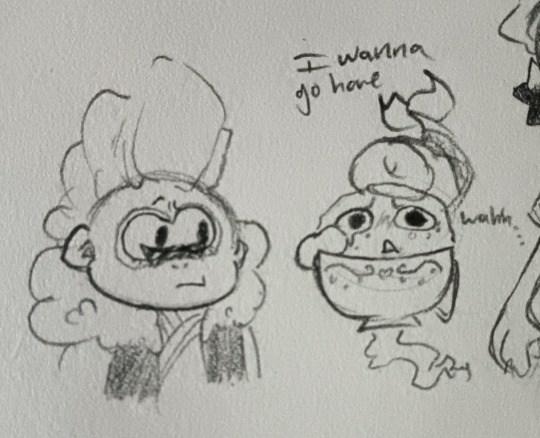
Freaky ahh bowl of rice...what's he on about
"But Yōmakai isn't this a maddiman post. Why are the first two things besides the intro not ma" IM GETTING THERE. PATIENCE
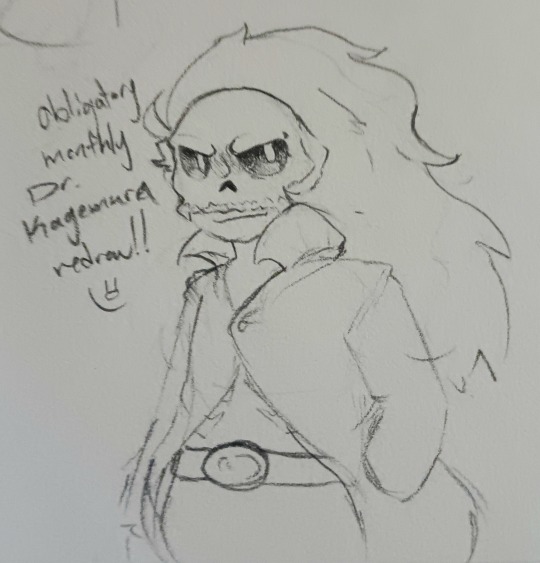
I redraw Kagemura every now and then to see if I improve!! :) Think I kinda ate w this one frfr
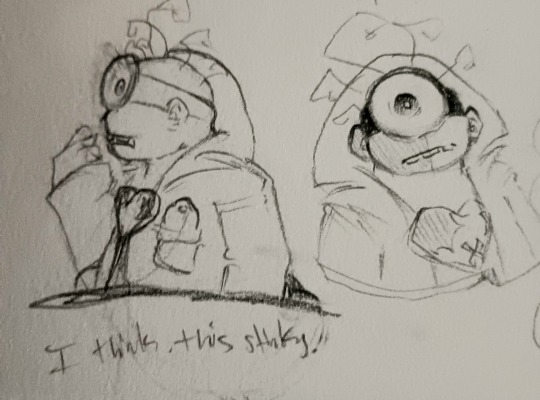
No me mires con tus estupidos ojos
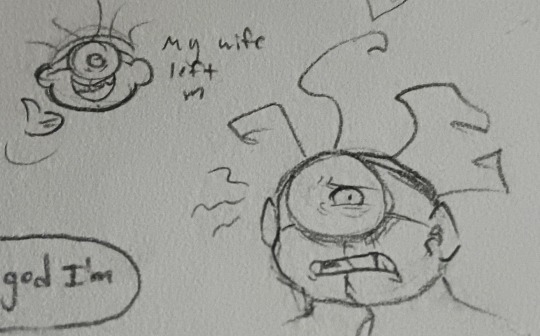
UEgh. judging you btw
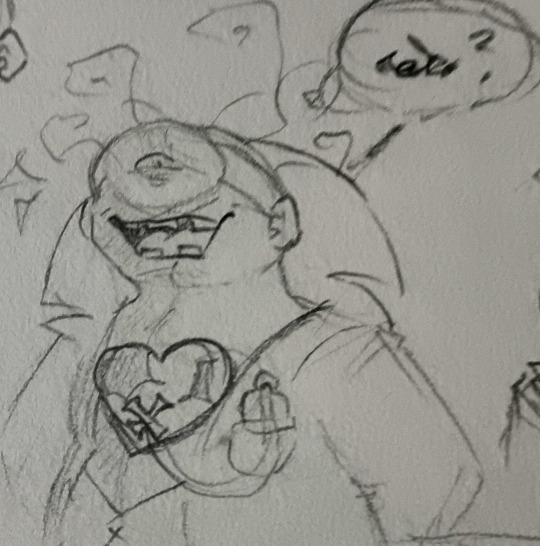
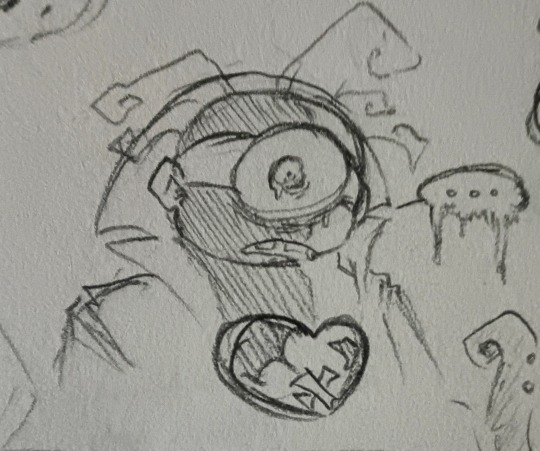
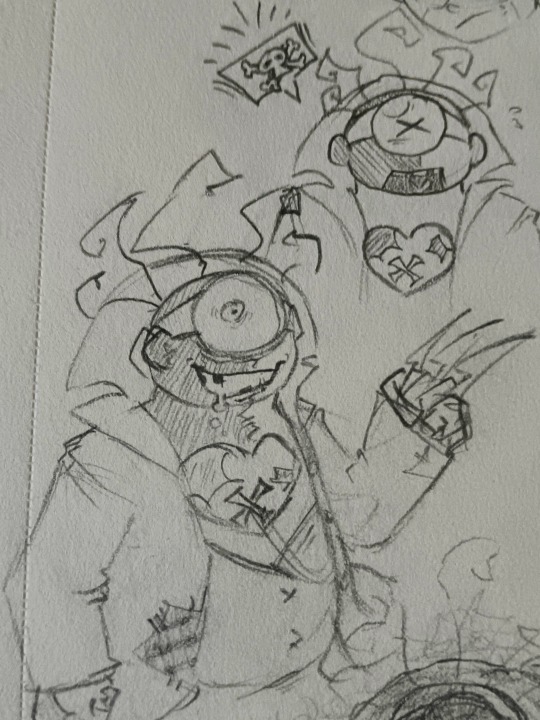
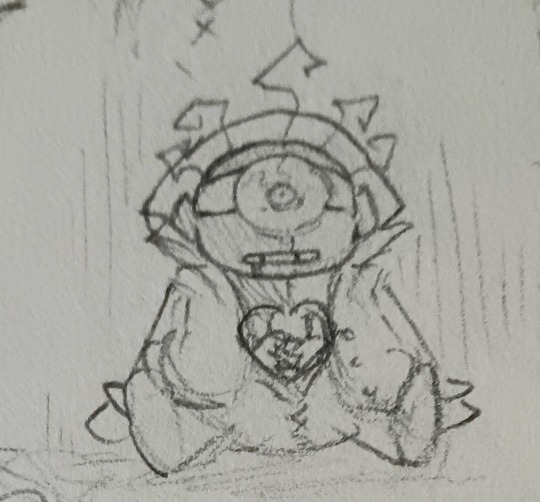
Expression stuff cause I love seeing different depictions both from other people and within my own mind
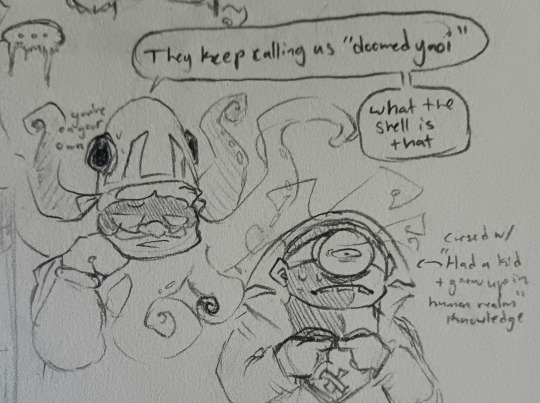
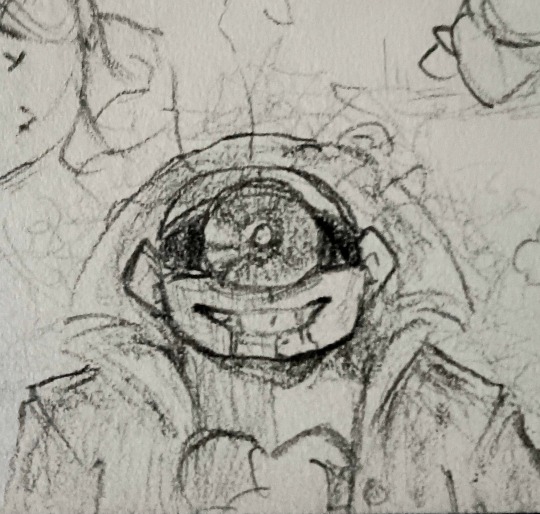
Mini thing based on a. Trend jm noticing LMAO
Also this Maddiman that scared some of my friends apparently 😔💔
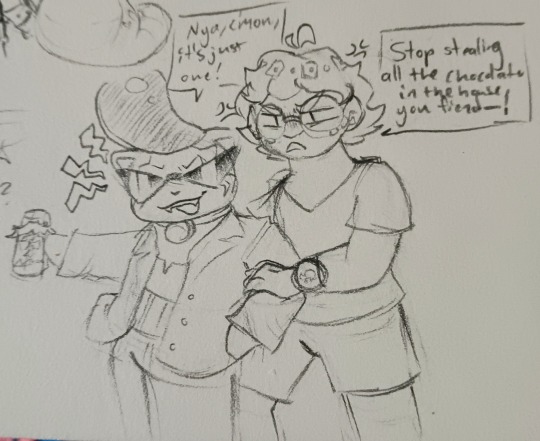
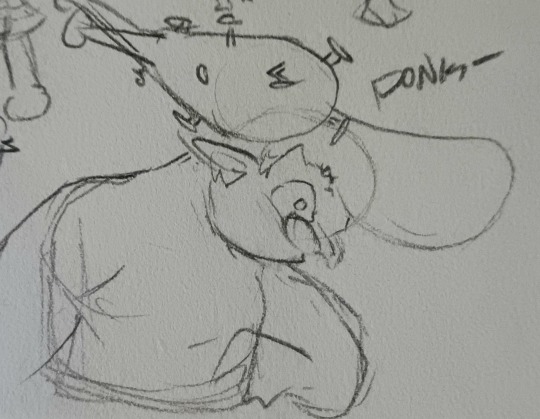
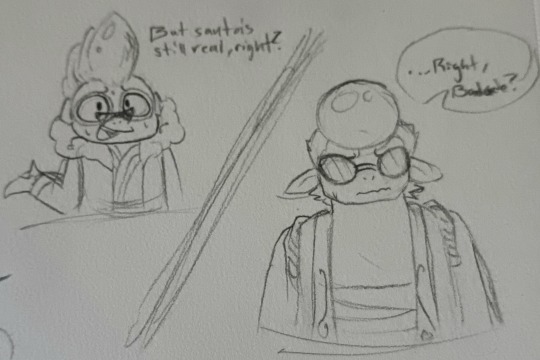
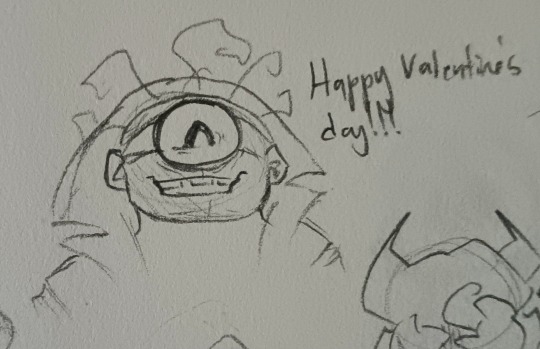
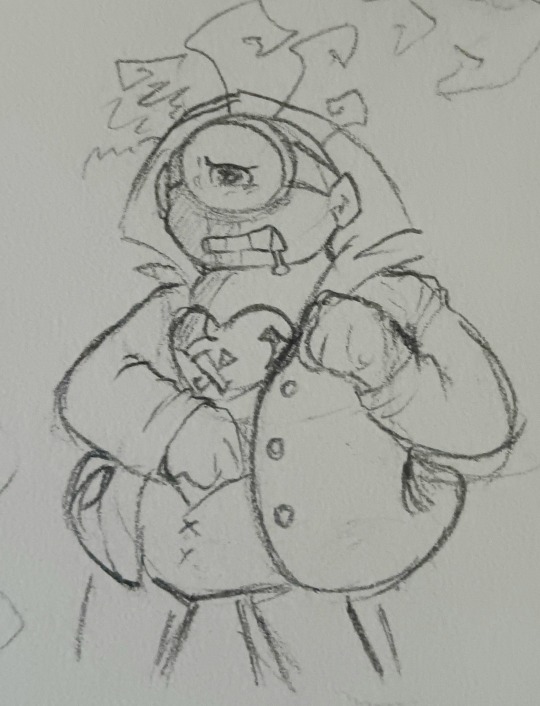
AU shenanigans and this idiot again. HATE HIM BLOW HIM UP NOW!!!! Jkjk i wish people drew him more i love him :)
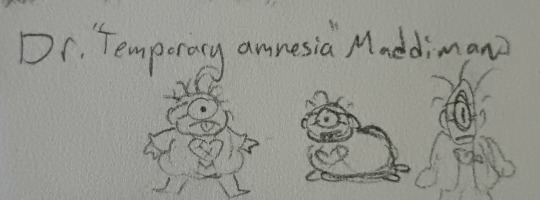
Anyways all done :) see you!!
#ghuhdjdedjed I like him!!! He's neat#also other things too#like slightly unhinged#crossposting this to EspacioHola later cause I need to post more often there guhuhu'''#●posts from yomakai#□ yolo watch 2!#are any of my art posts ever not going to have that tag...#yokai watch#dr. maddiman#maddiman#babblong#rawry#Caspian Hernandez#Ebi#Ebi ykw#Wotchagot#By the way!! Is my posting style kinda ehhh for lack of a better word annoying?#Someone kinda subtly hinted at my stuff being rather wordy/lengthy the other day (well. not all that subtle) and If that's the case I can#Summarize!! Or something#Or save more doodly stuff for like s[acehey/pixiv or something lol#for now tho!! Here's Madds :)#thanks for looking at my art stuffs anyways it means a lot to me ^u^ !!!! I'm happy I get to make people happy with my arts#btw mid post yomakai but i can't figure out how to add multiple pictures so I'll come back and say if I save the rest for tomorrow :o)#nvm you can tell the exact moment in post I figured it out LOL#myeahhh still posting thr rest tomorrow tho cause I forgot to name my files befr#Temporarily back on phone phew#Wait why am i writing all this down??#Know what it's cause I'm a yapper. Sigh#Sometimes you shouldn't read tags cause. You are cursed wirh the knowledge of my digital inexperience
26 notes
·
View notes
Text
Maybe I need to write Cardinal's Map so there's a contemporary book about the power of literature and reaching for a world beyond the mundane that isn't wall-to-wall inspirational platitudes with vague worldbuilding about the battle between the forces of good vs. evil.
#i say as though i would be able to avoid trite inspirational platitudes and vague worldbuilding#anyway my driving-filled day had me listening to nearly half of 'nightfall in the garden of deep time'#and i do like it#but it seems to be an awfully long and wordy book for a very simple story#(maybe it's the author's librivox-ish narration and my increased listening speed making it worse but it's still a thing)#anyway the vague inspirational messages about the power of creativity are getting to be a bit much#especially combined with worldbuilding that's mostly cryptic statements about how important it is for art to be good true and beautiful#which is a good thing! it'd just be nice if it was even a little subtle about it sometimes#i feel like this suffers coming after the latest amanda dykes book#with a lot of beauty but also a lot of characters who spoke solely in artsy inspirational platitudes#and coming after that one mg time travel book#that was supposed to be about a bookshop bringing in people from across time#but turned out to mostly be 'books are good which means this bookshop is full of good magic that needs to balance evil magic'#which was very stupid and didn't make use of the bookshop part of the premise at all#and anyway those similarities are dragging this book down for me#actually 'once a queen' did a pretty decent job with these kinds of things#worldbuilding kind of vague and metaphory but overall still an actual world#and characters who learned lessons without everyone in their life speaking only to metaphorically discuss the theme#anyway the actual book in question has me invested#but also rushing through it to get to the story beats because it's taking too long to get there#starting to suspect this would have made a good novella#because we know she's going to have a creative epiphany so dragging out the metaphors only hurts things
12 notes
·
View notes
Text
Tabled 6
“Change the vocabulary!” Myka has just exclaimed in a hotel room in an airport in Chicago, in a full-throated effort to bring Helena around to her newly realized way of thinking, here in this story occasioned by @barbarawar ’s months-ago @b-and-w-holiday-gift-exchange request regarding what would have happened if Myka and Helena had had their Boone-proposed coffee. Much has ensued since then: meetings poor and poorer, rendering hopes faint and fainter, leaving potentials squandered and... squandereder? Seeing to it that emotional moves make sense is always challenging, I find. People want to make sense to themselves, want to make sense of themselves, and someone as thinky as Myka would, I imagine, double-want that. But while we all contain multitudes, we tend to bumble through situations as unfull representations of those multitudes: weird gotta-keep-moving sharks desperate to present consistency. I too keep moving: trying to land this thing, even as it fights against the stick, remaining *this far* above ground. Apologies as always, my strung-along giftee. See part 1, part 2, part 3, part 4, and part 5 for the convoluted way we got here.
Tabled 6
“What?” Helena says, but it’s not her usual “what”; she’s obviously flummoxed, and her echo of Myka’s characteristic bafflement is precious. Preposterous, but precious.
Myka had hoped for some spark of recognition at her transformation of “change the rules,” but the confusion... it might be better. Sweeter. She tries not to make too much meaning out of this chime of similarity, even as she wants to pull that soft, bewildered “what” from the air and cradle it.
“I was trying to be clever,” she says. “Never mind that. And never mind fixing it, because we can do something else.”
“Repair it?” Helena says: a cautious, skeptical—and, yes, still baffled—synonym proffer.
Don’t laugh, Myka instructs herself, but faced with the idea that Helena really might think they’re playing a word game, it’s hard to follow her own order. “Never mind that too,” she says, a chuckle bubbling in her throat. “Because never mind. Because that’s it. Because you know what we actually can do?”
Helena raises her hands up, high, obviously in question, but really for all the world as if she were indeed being held at gunpoint.
This is not ending as it began, Myka tells the universe. Not as it began, or any other way.
She chambers the only bullet she has, aiming it right at Helena’s heart.
She pulls the trigger with a smile: “Ignore it.”
Hands still high, Helena opens her mouth slightly, and she squints, as if Myka has morphed into a dangerously unidentifiable animal.
Yes, Myka thinks, wildly, trying to live up to that wariness, I’ve been genetically engineered right here in this island of a hotel room! A Warehouse agent crossed with a yawper who has her very own plans! Amorphous ones, but! This infusion of abandon—Moreau power?—gives her the strength to hold Helena’s gaze.
The standoff lasts until Helena gets her language working again. “That recommendation is... entirely specious,” she says. “And you sound uncharacteristically overwrought.”
It’s a wobbly pair of objections. Myka draws even more strength from Helena’s lack of conviction. “What if it is? What if I am?”
“I don’t believe the slate can be wiped clean,” Helena says, a little more firmly. “Nor do you.”
So you do think we know each other. “I’m not saying it can. I’m saying I know it’s dirty, and so do you. I’m saying we ignore it.”
Helena’s face, from her “what” until now, has been a study in something Myka honestly never expected to see from her: full (fully wrong-footed) incomprehension. Myka doesn’t blame her, for she’s finding herself pretty incomprehensible, but she presses on. “You were ready to ignore my Boone-changed opinion of you. Weren’t you. When you hoped I’d know I was the someone else.”
After a pause: “That was then,” Helena says, her resentment at Myka for having worked her way to that truth—and for having articulated it—very clear.
“Oh, not anymore?” Myka pushes. “Even though now we both know I was that someone, and that there wasn’t a Giselle?”
“That was then,” Helena repeats.
Wait... “There’s a Giselle now?” Myka can’t process it, if it’s so. If it’s so, she will have to let Helena leave, then bury her face in one of the expensive pillows from this room’s unignorable bed and scream.
Another head-toss, the most dramatic one thus far, accompanies Helena’s next words. “I’m of a mind to say yes. But pursuant to my previously articulated policy, I’ll tell the truth: there isn’t, but there could be. In the future. I agreed to meet with you today to ensure you wouldn’t mistake yourself over Pete, but I have no intention of stepping into a similarly mistaken place. I’ve done my best to let this go.”
Myka can’t accept any of those words. “Ignore that too,” she says. She would like to point out that that whole litany was pretty rich, coming from Ms. To-Continue-to-Speak-Together, but instead she zeroes in on what seems the clearest contradiction. “But if you’re letting this go, why do you care about me mistaking myself over Pete?”
“Why did you care about me mistaking myself in Boone?” Helena counters, sour.
The response is uncharacteristically incompetent, particularly because Helena already knows the answer. “I could repeat something somebody once told me, about not walking away from what she called ‘your truth,’” Myka says, with what she hopes is a “that was then” fillip. “But I won’t. What I’ll really say is, I asked you first.” She allows herself a half-breath to marvel at how unusual it is for her to have this much of the upper hand.
“I could say the same thing.” Helena is visibly struggling not to acknowledge Myka’s advantage, but she collapses, saying, “The former, not the latter. I didn’t ask you first,” her devotion to accuracy (or so Myka reads it) defeating her. “Nevertheless I could repeat the something somebody once told you. As the why.”
Myka continues to press. “But isn’t repetition boring? You hate being boring.” She hopes this observation might visit upon Helena that kick of so we do know each other: “I bet you threw your coffee on me just so I wouldn’t walk away thinking how dull you’d been.”
“That was not the reason,” Helena says, but with a press of lips that suggests a ripple of otherwise.
Here, Myka shouldn’t press. “Then what was the reason.”
“You were being recalcitrant, and you know it,” Helena says.
“And what are you being now?” Myka asks, as laconically—as lean-back, as Helena-esque—as she can.
That question causes Helena to scowl and move energy into her hands, extending and then bending her fingers; though she doesn’t quite form them into fists, her intent is clear: she wants to deck Myka. It’s glorious. Please, do it, Myka urges internally, so we can get this all out in the physical open.
But Helena resets her face and waves her hands, the flutter of fingers dispelling the energy and its threat. “Realistic,” she says, prim.
Quit acting like me, Myka would tell her, but for the fallout. What she says is, “I wish I still had this coffee,” pointing at the table, the tragic cup-ceremony of which probably now deserves replaying as farce. Or was it farce the first time? No surprise, really, that they would skip-jump their way over the natural course of history.
“Yes, because stains solve problems,” Helena sarcastics.
Maybe; maybe not. Nevertheless, Myka says what’s true: “You seemed to think they would. And anyway, they redound to your benefit.” Helena greets this with a completely reasonable additional “what,” but Myka blows past it with, “Maybe because you ignore them? Anyway, this one here”—she gestures to the now-dry coffee-map on her shirt (it looks like no country, and she’s disappointed to be unable to name it as “this Brazil” or “this Azerbaijan”)—“kept me from walking away when you thought I shouldn’t.”
“A delaying tactic,” Helena says, offering only bored disdain, as if the very idea of it had been in the end inconsequential.
Keep pushing. “How long was that delay supposed to last, anyway?”
Helena doesn’t have an answer; Myka knows it because she begins to pace. She starts, of course, at the doorway, then walks past the bed, over to the window, and back again: bed then doorway, doorway then bed, bed then window, back and forth—six times, Myka counts—before she leans her back against the door, crosses her arms over her chest, and says, “Why are you tempting me this way? Why this way? What’s changed? In this room, in the few breaths since resignation and coffee, what’s changed?” It’s a fret.
“Well, what’s changed for you?” Myka asks, with no fret at all for once in her life. “More breaths since, but why did authority let you out of Boone-prison?”
Helena’s face produces an inscrutable scowl-smile hybrid. She thrusts herself away from the door, walks to the bed, rubs her hands together. Re-gathering energy? “I suppose I could offer a long-winded explanation about having been given to understand that the balance of safety and threat had shifted. But instead, to quote: ‘What I’ll really say is, I asked you first.’”
“Well played,” Myka admits. In return, she’s gifted with the little acknowledging bow of head she loves. (Loves—yes.) It draws her physically closer, that head-bow: only a few shuffling inches, but enough that she can answer, more quietly, “What’s changed is I saw a future. And I saw how much I’m willing to ignore to have it.”
“I do not understand your morality,” Helena says. This time, she sounds a note of wonder rather than censure.
So much recursion in what they say, think, feel, do—once, then back again, and then again. Maybe they’re bound to get something right, if they try everything over and over? This particular repetition-with-variation seems a little better than usual, tragedy repeated not as farce but as fairy tale... or, no: Warehouse tale. Because for better or worse, there’s no escaping the Warehouse, the curse but also blessing of wonder. She and Helena are here together today only because of the Warehouse—that necessary condition of their meeting and connection.
Myka could dilate forever upon fate and purpose, but “ignore it” must be her mantra now, her grounding principle. For better or worse... for better and worse. The true moral of any Warehouse tale.
“I don’t understand anybody’s morality,” she says, “especially not mine or yours. I’m not trying to. I’m ignoring that too.”
But what she can’t ignore—not now, not anymore—is the way in which their bodies have, so gradually, continued to near, with Helena slowly mirroring Myka’s movements, these little distance-closing developments. So small is the gap between them now, the displacement it would take to touch surely must be measured by time, not distance.
And yet she hesitates, for this raise of hand must speak correctly: not want, but offer.
Slow. Stretch that time, turn it back into space.
She does that, moving as slowly as she can. More slowly than she ever has.
Helena doesn’t retreat.
Minimalist increments... yet their yield is immense: Myka’s right hand meets Helena’s left, and their fingers link and twist, palms not pressed but near.
It is their first genuinely mutual touch since Boone.
“I will be blunt,” Helena says, soft, burred by the contact. “I need you to... just say.”
Blunt. This knife of request—indeed unsharp—meets Myka’s fears, at first bending against them, yet still bearing threat. The force of it makes her glance away, and again she’s drawn to the clock. All she can find to articulate is, “I missed my flight.”
It could have been a way of saying, but Myka didn’t mean it like that, and Helena knows it: she raises an eyebrow. The leavening takes away the knife, and it gives Myka leave to lighten too, to postulate, “Maybe we’re constitutionally incapable. Of the saying. Or maybe it’s just me? Okay, not maybe—probably. Is that a dealbreaker?”
Now Helena cocks her head, completing the gesture with a lifting twist of chin. It calls of early, early: Helena handcuffed in a chair, Myka foolishly imagining she knew how all the ensuing moments would go—then being flung up to meet the ceiling.
The book would have known that would happen, but Myka didn’t. Hasn’t. Flights, crashes. Over and over, each as unpredictable as every other. Which will Helena choose to inflict now?
“Have we agreed to a deal?” Helena asks. The question isn’t coy. “Ignoring may be a way forward, but historically, you do seem to presuppose the existence of agreements that you fail to inform me I’m a party to. That you then accuse me of violating.”
So: an objection, but one grounded in their shared history. A flight and a crash. “That is an uncomfortably accurate description of what I do,” Myka admits. “Let me start again. I missed my flight. Did you?”
“Miss your flight? Yes.” More leavening: unfunny joking, words for the sake of them. To continue to speak together... of course this has been what Myka wished too. Of course she would listen to Helena saying words about anything.
Not anything, her Boone-and-Giselle-haunted memory reminds her...
“But that was not the issue under discussion,” Helena continues. A providential interruption.
“Right. Dealbreaker. Saying. Inability.” Why are you vamping? What is the impediment? The answer is immediate: You are the impediment. “Change the vocabulary” was a nice idea, but one word was never going to be enough. “Look,” she begins, determined now to do better, “I—”
Helena tightens her fingers’ grasp against Myka’s. It’s a very different way of getting things out in the physical open. “Wanting you warps all I do,” she whispers. The words, the grasp: both are saying. Out in the open.
More even than the oh-so-welcome grasp, the words mean everything to Myka. And their meaning is itself everything—everything that matters—so she steals them and says them back: “Wanting you warps all I do.” It’s mind-clearingly correct. The relief of at last having an accurate description of the past half-decade: it hits her like that slug she’d perversely hoped Helena might deliver.
But having used Helena’s words, however perfect, while coming up with none of her own pains her, so she feels she has to modify, “Warps. And warped, but not in any of the ways that might have helped. I can’t apologize enough for how I got it all so wrong.”
Helena’s tilt of head gentles. Her chin drops. “Someone has recently recommended, rather eloquently, ignoring such things.” She smiles. “You are terrible at following your own prescription.”
Helpless to object, Myka says, “That can’t come as a surprise.”
“A surprise? No. Perhaps an obstacle.”
“Would you... surmount it?”
Helena says, “For you...”
Myka fears she hears a lift of question. “That’s what I meant. Would you?”
“As stated: for you.”
The certainty is... transporting. Nevertheless, “I don’t know how this will work,” Myka admits. “If this will work.”
“Nor do I,” Helena says, yet her admission is a balm.
So much remains to be negotiated. So fragile this semi-resolution between their hands.
Then: “I’m so tired,” Helena says, actual rather than despondent, and Myka is ready to agree that yes, she is tired too, that everything that’s taken place in this room has taxed her to her limits, but Helena follows that admission with, “Will you lie down with me?”
Myka tenses. Her immediate, insistent bodily approval of the idea jangles against her just-as-immediate worry over where such a request—and such approval—might lead.
No doubt feeling that stiffening via their still-joined hands, Helena says, “For rest. Rest, in privacy, and nothing more.”
Myka believes her. She doesn’t trust herself, for her self is a serial liar with terrible impulse control, but she believes Helena.
Who is also a serial liar, one with similarly terrible impulse control, but saying “no” to this person who has so lately spoken of want and warp, this person whose hands continue to grip hers, is not an option.
Thus in a hotel room in an airport in Chicago, Myka lies down on a bed, and Helena lies beside her. They shift their bodies awkwardly, then less so, as they find a fit: Myka on her back, Helena on Myka’s left side, curled like punctuation around everything they’ve suffered.
From a position moments ago unimaginable, Myka finds room to ask, “What are you doing?”
“What? Nothing,” Helena says, as if Myka has made an accusation. She stills the slight, slight stroke her fingers have begun to apply to Myka’s hair.
More unfunny comedy. “I don’t mean with your hand. I mean, every day. In your life.”
“Oh,” Helena says. The stroke resumes. “Waiting.”
“You said you hadn’t stopped living.”
“That is not what I said.”
“If you could press pause on the semantics.” It’s true that Myka could—should—quote with greater accuracy, given that she knows exactly what Helena said. But Helena knows that Myka knows exactly what Helena said, and while continuing to speak together is the weirdly frustrating joy it is, they should really try to get somewhere.
Helena sighs; the sound contains a put-upon “fine.” She says, “I pretend to have expertise in several areas, including forensic analysis, for which pretensions I’m paid absurd amounts of money.”
“Ends before means?” Myka asks, a tiny joke.
“My own fabulism is unsurpassed.”
That’s probably a joke too, but thinking back on her own vast course of lies, Myka finds it important to counterclaim, “I’m not sure that’s true.”
“Does competition truly matter at this late date? A win in this category is dubious—sinful, even—but today I’m inclined to concede your victory in anything you like.”
So she understood Myka was talking about herself; is that pleasing or disturbing? In any case, Myka does know the concession as a surprise: “You are?”
“Today. For here we are, at rest. Salvaged. By you.”
“But only because you wrecked my shirt,” Myka reminds her.
They’ve been wrecked, over and over, with stained shirts only the most recent, small detritus. Yet here they are, salvaged, washed up on some unfamiliar shore... this island of a hotel room: no Moreau; instead, uncharted.
Would that it were an island, one they could make their home.
“Only because,” Helena echoes. “Only because you were being recalcitrant... but we can’t carry such recursion back ab ovo.”
“Or we can,” Myka says with a hiccupy laugh, momentarily captured by the possibility, seeing it as a burrowing-in, a we-got-here-and-this-is-how affirmation.
“This from the woman whose mantra would be ‘ignore it’?”
“Game show,” Myka goes on, the laugh persisting; there’s no escaping the beautiful fact—she might have imagined it would be true but now it’s a fact—that lying with Helena wrapped around her makes her giddy. “Whoever buzzes in with the preceding turning point the fastest gets...”
“What?”
“I was about to say ‘a point,’ but that sounds weird. A point for a point?”
Helena’s cheek flexes against Myka’s, in what Myka suspects is her I-don’t-quite-understand squint. “A point for a point... surely that should be the name of the program? But I’m not conversant with game shows.”
“You are a little. Whammies.”
Another flex of cheek. “The current argot for being affected by an artifact?”
She’s right. But. “It’s from a game show. The coinage... it’s Pete’s.” Myka wishes she could have forever avoided introducing him into the conversation, the room, the problem. But in the end this hotel room isn’t an island.
Helena nods. The movement is an acknowledgement of what Myka has done—but it’s also yet another blessed slide of her skin against Myka’s. “What will you tell him?” Helena asks, and Myka can face the question only sideways, through the warmth of the slide.
Lying in bed is unquestionably better than sitting at a table. Myka nevertheless feels an incipient lie forming, a dodge to push off difficulty: I don’t know, she could tell Helena, and maybe that lie of omission would suffice, here as they lie in a comfort Myka has already disturbed more than enough.
However. The truth is she’ll tell him whatever she has to, to get herself free. To make him let go. So that’s what she says to Helena: “Whatever it takes.”
To her shock, the out-loud saying wallops her with a vision of a still different future, one stark and Warehouse-less. The view is empty: of purpose, of feeling. A disaster. “What happens if I burn it all down?” she asks. Her heartbeat speeds; her blood floods fearful.
“As you should have in Boone?” Helena responds, with acid; then, “Sorry. Momentarily failed to follow the ‘ignore’ prescription myself.” She raises herself on an elbow and looks down at Myka. It’s a new, breathtaking view, one that Myka feels her prior lack of as acute deprivation.
Into that negative space, Helena says, “If you burn it all down, then you and I will rise from the ashes.”
Every word is clear as still water.
Purpose: Myka and Helena, rising. Not empty of feeling; rather, replete. That reward would elevate.
“Is that what you want?” Helena asks. “To burn it down?”
“Yes.” Myka can say it; it’s true, if the rise is the result. And yet she can’t uncommit her professional self so easily and entirely. “But also no. And I have to tell him something.”
“‘Ignore’ is a powerful word,” Helena observes.
“I don’t think that will work,” Myka says, for she can hear his escalating “but why” iterations as clearly as if she were herself the Ladies’ Oracle of the uncanny book. “I’ll have to explain. That I was wrong?” she tries, but that’s too small. “That I’m always wrong and he should have known that?”
“Really? Then you must be wrong about me as well.”
“Don’t use my overgeneralizing words against me,” Myka says. She touches Helena’s temple, intending it as a rebuke.
It lands instead as a caress, against which Helena leans and nestles. “Aren’t I using them against me?” she asks, low and amused.
Myka says, because she can’t not, because the words are desperate to be said, “This. I want this.” Joking, disputing, speaking, bodies together (and so much more of bodies together): all of this.
“Me using your words against myself? I see why you would.” Helena smiles against Myka’s neck, then raises herself up again, her expression changing over. “But thank you. For saying.” She follows this by reclining, nestling closer still.
The words, and the movement, are warming, but leaning all the way in would lead down a path too tantalizing. “You’re welcome,” Myka says, but she follows it with, “When we leave this room. What will you do?” she asks, because this is something she doesn’t know but might now learn, no book required. Just a Helena.
But there’s no “just” about Helena, and particularly not when she’s gazing up at Myka, sweet yet flinty, and that look tempers her answer. “Wait,” she says, differently than she said “waiting”; now the task rings of burden and freedom both. Waiting for something, rather than waiting, without predicate.
However, that predicate: Myka is the one who must act. “I’m sorry,” she says.
“I’m accustomed.”
The little shrug of resignation that accompanies those words: Myka feels it small against her shoulder, but its implications make it seem a larger shudder. Helena has waited through so much—decades of punishments, and Myka should not make her suffer anything even vaguely similar. She’s about to say “I’ll hurry,” even with no idea of what that would look like, but she’s preempted by Helena saying, into her ear, “But please hurry.” A breath of telepathic direction.
So. Now she must.
Yet that direction requires changing not the rules, nor even the vocabulary, but the speed with which the future is ushered near. It’s a daunting prospect.
Daunting but necessary, if Myka is to blunder satisfactorily. “I will,” she says. But what is necessary isn’t sufficient, not if the goal is to bring about the truly desired future. “Once I’ve done... that. What comes next?”
Helena shifts her position again, un-nestling herself from Myka’s neck, her head still on the bed but reared back a bit, looking up, and Myka tilts her head to look down. She’s often had to angle down, just that bit, to look into Helena’s eyes, but this prone person is a dramatically differently enjoyable inflection of the standing version.
As she appreciates the view, she receives Helena’s answer: “You should text me.”
So strange to hear that voice say that sentence. But relief dizzies Myka, even as she’s reclining and looking, for she realizes it’s just strange; Helena saying it doesn’t make her seem a stranger.
“And then we should meet for coffee,” Helena adds—lightly, but not throwaway.
“Or save the world?” Myka says, trying for the besting echo. Trying to overwrite the words said in Boone.
“And save the world,” Helena says. “Our world.”
The modified callback is pointed and just right; it overrides both Boone and Myka’s attempt. Myka shakes her head and says, “I’m no match for you.”
“Counterpoint: you are the match for me.”
How can it be true that Helena is saying these words? Ever, but more so here, on this day, the one Myka intended to end with the end, this day, that is instead ending with a beginning.
Not enough of a beginning, though, and Myka wants to make that clear—that, and her regret at its clear, clear, clear, yet absolutely necessary insufficiency. She says, “I want to kiss you more than I’ve ever wanted anything in my life.” Helena doesn’t move; she has to know what’s coming next, and Myka delivers it: “But I can’t.”
Helena sighs. “I do not understand your morality.”
Third time the charm—the Helena-knows-it charm.
She might as well know it, because who is Myka, really, to recognize and hold to some bright line? But to start now would entail a foundational lie—“I’m free”—one that would infect all that came after.
You could ignore that too...
Animals, animals. Of course they would advocate for the body getting what it wants, regardless of consequences.
But the dismissal of obligation, though it might seem easy now, can’t help but make realizing the future more strenuous. Myka should not increase the burden. Thus in the end, despite the pain of want, she has to get herself out from under the bodily lie she so desperately and foolishly told—she has to do that before she can give herself leave to know the bodily truth. It may be just as desperate and foolish, if differently so, but she wants, wants, wants to know it.
“Like I said, I don’t either,” she says, to ward off, for what she hopes will this time not seem forever, Helena’s charm. So as to think herself as far away as possible from the basic physical reality that a tiny turn of her head could “accidentally” join their lips, she turns the opposite way and tells the ceiling, “I have to rebook my flights now.”
“To set the future in motion,” Helena says. Agreement, but aggrieved.
Myka smiles at both of those, allowing herself a minimal turn back toward Helena. She’s a far better sight than the ceiling. “You do know something about that.”
Helena breathes out, probably in more-aggrieved affirmation, and she makes no move to sit up. Is it possible to be aggressively still?
Helena’s answer is an impressive yes.
Myka allows herself a dispensation, as she did when she watched Helena approach in the airport, so many hours ago: twenty more breaths before she takes the get-up initiative, as Helena very clearly intends to force her to do. So she breathes. Very. Very. Slowly. Inhale: beat... beat... for as many beats as she can manage. Hold, for the same: an the number is not small. Exhale again as many, then again, hold. That’s one. Inhale. Hold. Exhale. Hold. Two.
Eighteen more of these with Helena warm against her; it isn’t how she ever imagined heaven, or its earthly approximation, but here it is.
For now.
Right as she reaches inhale thirteen: “Are you asleep?” Helena whispers.
“Sssh. I’m counting.”
Helena doesn’t ask “what.” She stays still, now solid and present only, until Myka reaches the pause after her twentieth exhale.
Disengagement is difficult.
After, they busy themselves with phones and booking. Myka situates herself at the desk, while Helena reclines on the bed: these stations they might have taken if they had done nothing but inhabit this room as travelers, travelers now bored before departing.
Helena finishes before Myka does, at which point her reclining becomes reclining, a grandiose occupying of space. A new Helena aspect, and Myka would never have seen it, never if not for salvage, wrecking, recalcitrance... back and back and back. How they got here.
“I don’t want to leave,” she tells that new grandiosity.
Helena stretches, arms up then sweeping wide, as if making a snow angel. Then she props herself up on her elbows. She moves both her hands, a finger-flutter suggesting that whatever statement she about to issue is obvious. And it is: “Then we’ll stay forever.”
For a brief counterfactual burst of cosmology, Myka believes they could. But this time Helena is the one to rise and dismiss the possibility, although she does it with still more ostentation: “And yet this room is entirely inappropriate as anyone’s final resting place.”
Myka loves every muscled, meaningful emphasis. From inside that love, she pities her earlier-today self, the one who thought she could have lived without the continued possibility of this.
Well. She could have lived. But it wouldn’t have been living.
For all their need to speak together, their final minutes in the room are silent, as if refraining from using that small duration of their privacy to the purpose they set, they might be able to bank it. Against some unprivate, nonspeaking future.
As they reenter the unprivate hallway and head toward the far greater unprivate spaces of transit, Myka says, “That coffee was expensive.”
“Worth every penny.” The and you know it is inescapable.
Inescapable and true.
Helena’s flight is scheduled to leave well before (the first of) Myka’s is—New York is so much easier to reach than anyplace named Dakota.
“Not The Dakota,” Helena says when Myka shares this gloomy observation with her, as they wait for the tram to the terminals.
Myka doesn’t know whether to groan or congratulate her on the reference. She settles for a sincere “Touché,” then asks, “Should I come to your gate with you? To... sit?” She’s thinking on sitting together. Sitting together. What people see when they look.
“Should you?” Helena asks back, with an eyebrow.
“No,” Myka has to concede. “I’d want to kiss you goodbye.”
“Anyone looking would expect you to kiss me, and/or me to kiss you. Goodbye or otherwise. But you’ve made it clear that isn’t in the offing until we can fulfill everyone’s expectations.”
“Everyone’s?”
“Ours and those of fortunate observers.”
“Of course you’d think they’re fortunate,” Myka says; she hears and feels affection—distinct from want—in her voice. Affection has been gone for so long between them... she welcomes its old-friend tenderness, gently yet insistently shouldering its way through all that must be ignored.
More eyebrow, differently inflected. “Of course they are fortunate. You underestimate our beauty but, more significantly, your own.”
Such a compliment is unassimilable right now, so Myka counters with, “But not yours. I don’t underestimate yours.”
Helena leans backward. “Your saying such things is why you should not come with me to my gate,” she says, and Myka reads the lean as speaking commensurately about what is unassimilable. “Because I want you to come with me,” Helena goes on, to Myka’s delight, “and then to board the flight with me.”
“Burning it all down,” Myka notes.
“Which you don’t want to do,” Helena notes back.
“But I will if I have to.”
Helena now offers a wrinkle of brow. “There is almost always a better way. You showed me that.”
The wrinkle doesn’t belong, so Myka tries to smooth it by saying, with a lightness, “You were going to freeze it all down. Totally different.”
“In any event the way found then was better... and, I must say, better than shooting you in the head.” Helena says this dry, joking back, yet also a little stunned, probably at the idea that Myka would joke in the first place.
Myka answers that surprise with, “I’m pretty happy you thought so.”
Helena doesn’t move, but she says—tight, as if dampening some vibration—“Your understatement is rhetorically effective. In that I now want to kiss you more than I ever thought I could again be capable of wanting.”
This should be simple. Grab her right now and never let her go. But nothing is as simple as it should be, so Myka says, “I’ll bear that understatement thing in mind.”
“I suspect I’m weak for a wide array of rhetorical techniques. When deployed by you.”
The bubbling of possibility is... irresistible. “I’ll make a study,” Myka says, exerting great effort to keep herself under control. “Maybe litotes next.”
“Not ineffective, you may find.”
They are tuned tight to each other now. In public, but speaking privately. If they can keep this alignment... they’ve had it before, lost it, got it back. Myka lets herself dissolve into one final dispensation: the blissful idea that they will always get it back.
Are there any words to describe what she is, other than “in love”? If so, she doesn’t want to know them.
She also doesn’t want to watch Helena walk away. She’s mourned such walks too often. So they clasp hands one more time, then let go; Helena turns away, and Myka, after enjoying the movement of Helena’s hair the turn occasions—that swirl of fluid promise—does too.
****
At the Sioux Falls airport—which Myka, hating its provincial familiarity, always greets with an internal but why do I have to know this place whine—she wants nothing more than to roll off the plane and into the car she’d parked in the absurdly small lot so many hours or days ago, thence rolling on to the B&B and into some state that might, if she’s lucky, resemble sleep.
What she wants is not what she gets.
Mrs. Frederic is standing by the security exit.
TBC
#bering and wells#Warehouse 13#fanfic#Tabled#B&W holiday gift exchange#part 6#barbarawar#I tried so hard to make it end here#but no dice#I can't apologize enough for getting tangled in the complications#(it occurs to me that maybe there's an artifact in that hotel room making it all so wordy)#(okay not really)#(but this thing might've worked better if M and H had had to deal with a coffeemaker that brewed up a djinn or something instead)#(could've sent the story into territory too unserious though)#(which seems like it would have been cheaty)
38 notes
·
View notes
Text
ok so after posting about how burnt out i've been this year i had a thought to stop letting helene constantly fucking jumpscare me all the time (i saw a new picture of it earlier today & it felt like getting lightly punched in the solar plexus) & address it for real by writing out every little detail i can remember so anyway i'm 7 pages/3212 words in and only halfway through the actual hurricane
#i had to start with the calm before the storm obviously.......sept 25-26 were a Thing all on their own#my original idea was writing a script for a sort of narrative comic diary thing but y'all know i have a habit of getting wayy too wordy#so if i don't make it to the end of this thing & still have the drive to make it a comic who knows if it will ever see the light of day#but i think it could help me process things a lil. even if i'm technically reliving that time i can analyze it a bit now & pick it apart#i have to stop for now tho & go to bed immediatelyyy bc i Do think i accidentally triggered myself a lil oopsies !! got too into my memory#doesnt help that i'm currently using the same lamp that i was using while my power was out so my brain keeps tryin to tell me falsehoods#its weird tho bc i do think i feel better about it. but also well aware this is not a mindset i want to be putting myself into lmaoo#honestly it's probalby just because it's 5am rn. i will sleep and then go “damn that was crazy. anyway” and i'll be normal again goodnight
2 notes
·
View notes
Text
while everyone is different and it's totally understandable to vent/feel overwhelmed, sometimes i do feel like people psych themselves out when they start qjj. they look at the map and see a lot of characters get introduced at once and immediately get caught up on how much there is to remember.
and that's fair!! but i do think it's good to keep in perspective that the books don't expect you to remember it all immediately. (imo) t97 does a really good job of making characters memorable and also does a fantastic job reminding you of who certain characters are when they re-enter the foreground. i think there's a tendency to feel like you have to pay attention to every little thing and commit it all to memory because the political plot goes so far, and that's valid.
but i'm telling you right now that you could fill thousands of pages with reminders and details and you're STILL going to forget or miss something. that's kind of part of the fun. there are so many things that can catch you off guard and there are actually certain important characters that are glazed over and left for you to forget. characters move in and out of the story, titles and positions change, people are lying, things aren't what they seem in many cases. not everything that seems important is and sometimes the most innocuous or unimportant detail is actually important. it's part of the fun!! the experience!!! the intrigue!!!!!
what i'm really trying to say here is that if you feel like you need a guide, use one or make one up on your own!! or wing it, that's what i ended up doing and personally it was easier and less stressful for my first time around!!! but don't let the sheer amount of information psyche you out. it's a long story, the author doesn't expect you to get or remember it all as soon as a character or place is mentioned on the page. your brain will actually recall more than you think and the story itself will give you reminders/fill in the gaps.
#read more is for length i got kinda wordy#this is meant to be encouragement and hopefully it comes across that way!!!!#its overwhelming!!!! i understand!!!!!!#use whatever you need to help!! and also!!!!!!#its okay to be like 'this honestly isnt my thing'. i think too often theres this expectation that we have to force ourself to read every#series in a genre and thats just not true. only read it if you like or find it interesting#you are reading for enjoyment!!! sometimes we think we'll like something and it ends up not being so#anyway anyway#thats just my two cents on it cause its something i see a lot#also you can reach out to others for help i promise no one bites tho you probably will get an info dump from me djsjhdjd#one thing about me is i will make the same 5 posts over and over again#my dumbass
2 notes
·
View notes
Text
✨noping out✨ of an awkward situation li k e
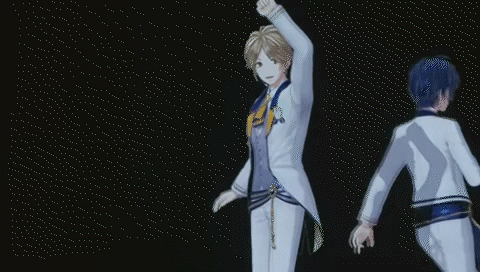
#(nansu’s mona interview was too cute so i *need* to laugh at lxl to end the night normally im not sorry—)#tonight’s dance is fiancé!!!!!!!!! the camera angles are a thing of beauty in this one y’all h a v e to watch it if you can#ok that’s enough of lxl i can see the gif past the tags anyway so. well~~~~~~~#anyways!!!! the mona interview!!!! the tl;dr of it is basically just nansu talking about mona’s 2nd album + the concert#and how the concert came about (long story short: she said ‘i wanna perform live as mona!’ to the staff in passing and her wish was granted)#***if i didnt read it wrong that is… um. proper tl this weekend if i have the energy i promise~~~~~#yk what since it’s just 2 pages in total i might as well tl the entire thing. it’s not as wordy as some of the past lxl + ft4 interviews so.#since her concert’s on saturday too… aaaaaaaa i wanna go~~~~~~~~~~~~~~~~~#mona live >>>>>>> lxl live you agree y/y—#only reason to look forward to lxl’s live is for the lxltwt fanartists’ drawings of the performance btw#bc m a n. they actually manage to make the dances seem decent (if only in the form of exquisite drawings)#the spell of the fanartists is lifted the moment the actual lxl dances break free from containment though lmao#i still recall having high expectations of tsuki no hime’s dance thanks to the fanart… then i saw *it*.#b u t since mona’s live will have songs from both albums im expecting lxl’s live to be the same in that regard#at the very least last stage and oshimahou should get dances… i think#i hope they actually do the heart poses in oshimahou though bc that’d be hilariously cringe (and suki.kirai already did it better no cap)#o k that’s enough lxl for one night gnnnnnnnn~~~~ see y’all tomorrow afternoon for a possible mona concert twt!!!!
4 notes
·
View notes
Text
i just really needed to get this off my chest cause its been weighing on me for the past few days but if anyone sees this don't mind my rambling and negativity
i hate how ive been avoiding reading new fics on tumblr again just as i was about to get back into it. i can feel myself overthinking and hesitating on reblogging a fic i like or just giving it a like or if i should give my thoughts and reactions like how i felt happy with doing for the past few weeks but now im overthinking everything cause the authors will see and idk judge my overly annoying words and now im just afraid im gonna offend all of them.
i blocked that last author because it was really weighing on me but now i feel like i also lost something in me cause i remembered that they were one of my favourite authors for the past few years but now i dont get to read their works anymore without feeling triggered. (besides i cant see their blog anymore which is a good thing anyway the block feature doing its JOB, X could never!!)
i know its good to support writers and give feedback and such but i already have such a hard time interacting with people in real life, i was trying to build a safe space in this corner of the internet but i can feel myself regressing back into my bad habits and overthinking and getting anxious just because i got triggered by one comment last weekend.
i guess i'll just slowly rebuild that expressiveness again but i dont know if i'll ever get back to commenting like i did before -- this also feels super dramatic but idk its just the feelings ugh
#fallen back into bad habits#i'll just focus on writing my own fics instead of mourning the loss of the ones i cant reread#literally its a wordy brain dump thats so negative so just ignore this if u get triggered by those things#i was doing so well (mentally) too these past few weeks#then this happened#plus an old client/friend thing i found out last night kinda brought me down#ugh wtvr pls bounce back @self
2 notes
·
View notes
Text
How to Paint a Stained Glass Window on Canvas.
Ft. Princess Peach
I took a college class on Scene Painting once, and as our final project, we had to apply everything we learned and make a stained glass window out of canvas and paint.
We could copy any design we wanted, and I chose to do the Princess Peach stained glass window from the games.


Since I had a lot of fun making it, let me show you the process.
First, we divided the canvas into squares that are all the same size. 6 vertical squares and 4 horizontal squares. Do the same thing with the reference photo and then copy the lines using charcoal.


Next, you lightly brush off the charcoal, enough to still see the lines lightly and trace over them with Sharpie.

For this art piece, we needed to have a curtain as a part of the piece. What you want to do first is pick the base color you want to use. Then you get it in a shade that is lighter and darker than the original (mixing in white and black, respectively). You want to mimic the texture of curtains through your brush strokes and the shades of colors you use. The only advice I have for this is to follow the lines of the fabric and keep working on it until it feels right. Try alternating between the dark, original, and light paint. That's what I did.


Next is the color for the glass. This part is basically like a paint-by-number but with a twist. Since this is supposed to be a stained glass window, we want to be able to see through the canvas when there is light behind it. So, the paint has to be diluted with water. Also, we are not allowed to use the color white since it will block out the light. So, if you want a lighter color, you need to add a lot more water that paint. And if you want it darker, more paint than water. It is basically watercolors at this stage.
And let me tell you, it is super hard to get the right shade of pink from plain red paint and water. But, I did it.


After painting in color, you will want to go over the sharpie lines with black paint to make them stand out better.
Then, the final thing is to get some heavily diluted dark purple paint to create a shadow between the curtain and the stained glass window. Also, it is a good idea to make some thin shadow lines on the curtains and some gold tassles for decor.
And here is the final product:

This took me weeks of hard work, but it was so much fun and very therapeutic. I am still very proud of the final product.
If someone gave the materials and money for it, I would definitely want to do this again.
Now you can try this at home! Good luck!
#princess peach#stained glass window#art lesson#princess peach stained glass window#super mario#super mario princess peach#btw if you couldnt tell from the pictures#the painting is 6 ft tall and 4 ft wide#i have it hanging up#and it takes up a whole wall#this process should still work regardless of the size of your canvas#though i do recommend getting a canvas that is see through#we used a fabric called muslin that we stiffened with some sort of cornstarch liquid solution#i think we mixed cornstarch in warm water#then we used paint brushes to spread it on the canvas#and used push brooms to stiffen the fabric so we could paint on it#enjoy!#painting#painting art#painting lesson#video game art#princess peach art#sorry if this is too wordy#i get excited talking about these kinds of things
3 notes
·
View notes
Text
i dont know why the running joke of this chapter is kakashi fearing for his kidneys. where did that come from. WHY did that come from.
i should probably cut that in editing it's a little ridiculous.
except it makes me giggle every time so maybe i should leave it there.
#girl's mind fanfic#clena's writing progress#just have to write ONE more conversation and the whole chapter is done. but DAMN if editing wont be a bitch#still wondering if i should cut jiraiya's 3-page infodump#because while most people dont mind#some people keep commenting saying that my fic is too wordy and i keep adding unnecessary things#and like. they're 1% of reviews but i have the emotional fragility of a china teacup#i cry when i get those sorts of reviews and they ruin my day even tho i get twenty comments who love my rambling#but like. also. i shouldnt delete stuff from my fic just for the 1% of assholes who will say mean things about it#but also i dont want to cry when someone inevitably says something mean about it.#most if not all of said assholes are on fanfiction dot net so technically i could just stop cross posting#except there are people on that site who DO like my rambles so#ugh. why am i such an emotionally sensitive crybaby. my life would be so much better#if i didnt have such thin skin#i'm 90% certain that jiraiya's 3-page infodump is going to get LONGER with editing cause i'm gonna turn it from infodump into#an actual conversation. so who knows how many pages it'll be by the end. the chapter's already 6500 words#which is double my average chapter length#and i DO like the info he presents even if it maybe ISNT strictly required for progressing the story. probably only the last paragraph is#ugh. i wish people would just never say mean things ever. then i wouldn't have a problem with anything xD
5 notes
·
View notes
Text
regretting convincing myself another multi-chapter was "a good idea" and "fun," stuck worrying about the need to update it and the need to finish it in a reasonable timeframe.
#i don't think it's made me resent fandom's focus on multichapters any less either :S now i resent both that AND the fact i am writing one.#am i betraying the noble oneshot? am i admitting they're “not proper fics”? why am i even worrying about this stuff?#the complete multiparter will still be considered a short bitesized fic by the standard of everyone else's 300k that they wrote in a week :#meanwhile i feel like my current writing style is a bit too wordy and tending towards bloatedness so idk where to go from here#think i'm still vaguely unsettled by that “can you write an AU in only 5000 words?!?!” tumblr challenge a while ago#seems like everyone else writes lord of the rings on their first go and readers subscribe to everything assuming it'll get more chapters#ffs of all the things to feel insecure about why am i bothered by WORDCOUNTS?!#fic related#worrying about writing
3 notes
·
View notes
Text
.
#here's some of the classics on that list i have beef with btw:#i have tried to read A Confederacy of Dunces several times and it's funny but it's also so cringe and Ignatius is so obnoxious#that i find it too difficult to finish like i just feel depressed and bad for everybody around him too much#i tried reading Infinite Jest like a decade ago and i got like 200 pages in and i remember thinking it felt like#such a slog the entire time because he's just so gd wordy and also i stopped liking DFW after i heard the abuse allegations against him#frankenstein i didnt read that long ago but i just remember finding it so boring for some reason?? i feel i might need to read it again#dracula ngl i feel like im cheating a bit saying ive completely read it because i loved the beginning and then HATED so much of the rest#the characters were just so boring and melodramatic hahaha i just liked the part where jonathan was doing a travel diary#and trapped in the castle tbh and after that i skimmed quite a bit#i almost flipped my shit when i saw ender's game on there because I ALWAYS mix it up with ready player one by ernest cline#which i bought the audiobook of a while back and hated every minute of it i dont think its good at all#but it wasnt that so phew my faith in this list is somewhat restored#i read most of the first game of thrones book and was disappointed tbh maybe because id seen the show already#so i was like 'this feels almost exactly the same except worse?' because i'd been expecting it to give me more depth and insight#into the characters but instead it felt exactly the same and i still didnt love any of the characters enough to feel attached to them#also i am fully aware me not personally liking or vibing with a book doesnt mean it doesnt deserve to be considered great btw#but i think if youre gonna be like me and force yourself to go through a bunch of lists like this very seriously then you also need to just#let yourself be like 'yeah not for me' without feeling too bad about it sometimes too#often times i dont particularly love the classics or 'important books' but at the same time#i still feel like im getting more out of reading them than just grabbing the newest hyped up books that also dont do anything for me#maybe not in a 'wow i loved reading this' way but in like a#'i now have first-hand knowledge of this thing that is so influential / so frequently referenced'#or 'this challenged me and i feel like i did a mental/emotional workout or gave me some new food for thought'#or 'made me more aware of what gaps in my knowledge and reading skills and what my tastes are too'#sort of way...#it really just depends on what you're reading for and why and what you're hoping to get out of it a lot of the time maybe#it's like the homework i give myself to go through these lists that i also intersperse with the stuff i read more just for fun#p
3 notes
·
View notes
Text
🫠
#grant writing is stressful but almost too stressful and I dont know what to do#it’s only been a month and I’m like … can I do this? not so much the act of getting it done but#I dont know I just want to cry 😭 and have cried 😂 and don’t know what to do#part of me wants to use my brain power and efforts with other things#staring at wordy fucking prompts on a screen and trying to figure out how to answer them is making my brain hurt.#personal#daily feels#I wanted to have this started and close to done last week but humans were busy and now it’s due tomorrow and I just wanna close my computer
2 notes
·
View notes
Text
i really need to stop writing so much bc i end up exhausting myself after just one reply
#but every time i try it doesn't feel like enough#OR i can't figure out a way to end it quicker#I ALWAYS HAVE TOO MANY THOUGHTS ABOUT EVERYTHING my mental images are too vivid to not try to convey accurately#curse my insane need for unnecessarily wordy internal monologue about byan's ridiculously intense emotions!!!!!#i always want to explain why they're doing what they're doing or saying what they're saying#and it does not pair well with short digestible replies#i'm just annoyed at myself and my inability to do more than one or two things a day anymore pls ignore me lmao#i feel like i'm that guy where u get smth from me and ur all 'oh a reply! ......oh a reply...' bc it's always too!! long!!!#━━ ˟ ⊰ ✰ ooc ⋮ don't @ me.
2 notes
·
View notes